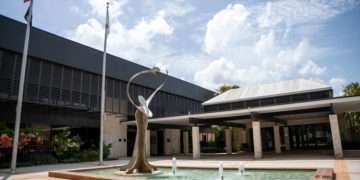The Bonita Estero Rail Trail project could transform a 12-mile portion of the Seminole Gulf Railway into a recreational biking trail spanning from northern Collier County to Alico Road in Lee County.
Friends of the Bonita Estero Rail Trail in partnership with nonprofit Trust for Public Land continue to push for the project with it gaining traction in recent weeks.
While local cyclists have been advocating for the project, it also caught the attention of St. Louis-based law firm Lewis Rice. It prompted two of the firm’s attorneys to host public information meetings in Estero for landowners who own land adjacent to the former railroad right-of-way.
Attorney Lindsay Brinton sought to inform landowners about the railroad conversion and explain their rights to compensation once the conversion begins.
“We anticipate that once the deal is done and the terms are negotiated that they will have to seek federal approval,” Brinton said. “They will then seek federal approval through [The National Trails System Act], and the Trails Act will then allow them the authority to sell this line to the trail group.”
The law grants the federal government the authority to turn abandoned railroad right-of-ways into a nationwide system of recreational trails, but not without compensation to adjacent landowners.
Brinton said federal law will come into play and preempt state law property rights, entitling landowners to compensation.
“There’s about 300 landowners along this 12-mile strip of railroad right-of-way. So anyone who holds land under this right-of-way that acquired its property before the date of taking, which has not yet occurred, is eligible to make a claim for compensation,” she said.
Brinton and attorney Meghan Largent have a combined 30 years of experience in representing landowners in rails-to-trails cases across the country, including in Georgia, Missouri, New York, Michigan and the Carolinas. 
The attorneys also have experience in Florida, representing Sarasota landowners in claims surrounding the Legacy Trail, which Friends of the Bonita Estero Rail Trail is modeling its plans and efforts after.
Lewis Rice attorneys said they won hundreds of thousands of dollars for landowners in Sarasota County, along with currently representing landowners in Pinellas and Miami-Dade counties for similar rail-trail conversions.
Submitting a claim will have no effect on landowner’s property easements or affect the trail, as it is simply a claim for compensation.
As for attorney fees and costs, Brinton and Largent take rail-to-trail cases on a contingency fee basis. If they are totally unsuccessful and landowners are awarded nothing, it comes with no cost to landowners.
However, if the attorneys are successful, then they will be compensated through a 1/3 contingency fee. “We also have the Uniform Relocation Act, and what that is, is a statute, but at the end of the case. It mandates that successful landowners shall be reimbursed for attorney fees and expenses,” Brinton said. “So, all of our expenses are reimbursed separately by the federal government.”
Brinton said she has had clients in the Friends of Legacy Trail who took the compensation and put it back into the project, but also had clients who didn’t want the trail or who thought the trail was good for the community but didn’t necessarily want it in their backyard.
“The point is you as the landowner have property rights,” Brinton said. “We cannot stop the trial. I always say we’re not pro-trial, we’re not anti-trail. We just want to make sure your constitutional rights are protected.”





